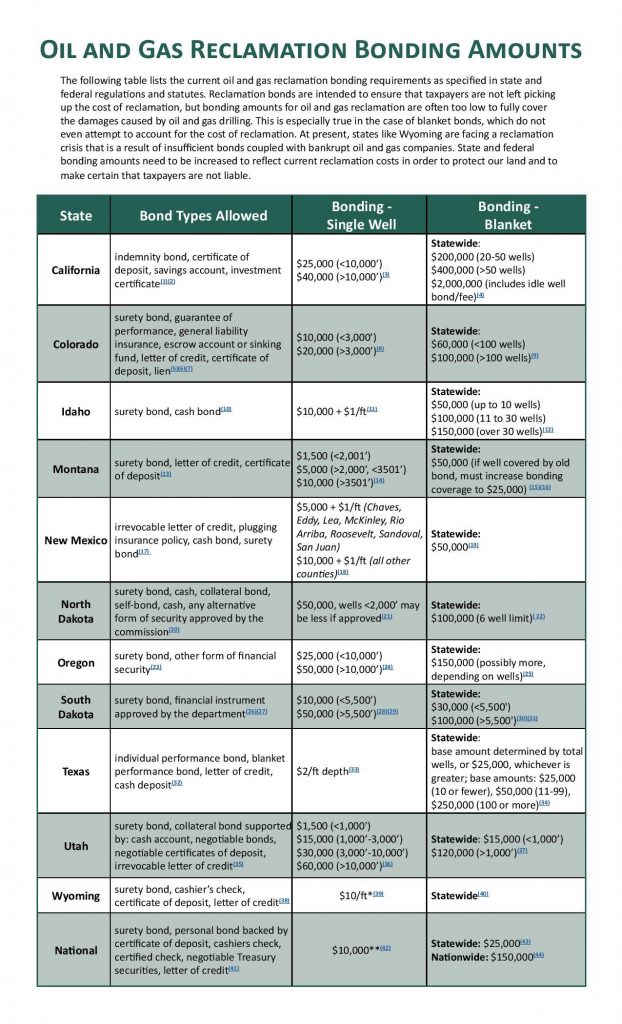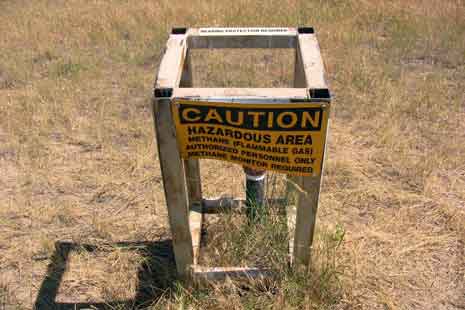Oil and gas reclamation bonds are intended to ensure that taxpayers are not left picking up the cost of well recovery, but bonding amounts for oil and gas reclamation are often too low to fully cover the damages caused by drilling. This is especially true in the case of blanket bonds, which do not even attempt to account for the cost of reclamation. A blanket bond sets an amount to cover, theoretically, reclamation of all the operator’s wells within a state or across the country.
Oil and gas bonding is particularly problematic because of the boom and bust nature of the industry. At present, states like Wyoming are facing a reclamation crisis that is a result of insufficient bonds coupled with bankrupt oil and gas companies.
A review of the reclamation bonding regulations and statutes in oil and gas producing states in the West, and national regulations and statutes governing federal lands and minerals managed by the Bureau of Land Management (BLM), highlighted key areas of weakness and concern with oil and gas bonding. Weaknesses include low bond amounts, statewide and national blanket bonds, and, in North Dakota, state regulators can allow oil and gas companies to “self-bond” or simply promise to pay reclamation costs in the future. The following table summarizes oil and gas reclamation bonding requirements as specified in state and federal regulations and statutes.

Some states allow alarmingly low bond amounts, considering actual reclamation costs. South Dakota, Utah and the BLM all require minimum statewide blanket bonding amounts of $30,000 or less. In Texas, the single well bond is only $2 per foot of well depth – the minimum bond for a 2,000-foot deep well would only be $4,000. Montana and Utah have minimum single well bonding amounts of only $1,500.
When you consider the actual costs of reclamation, current bonding requirements are apparently inadequate. According to a study of reclamation costs in Wyoming by Inside Energy, a collaborative journalism initiative, the average cost of reclaiming a single well has ranged from $569 – $527,829. Some newer, deeper wells may cost $17 million per well to reclaim.
By that measure, the blanket bonding requirement in New Mexico, and several other states, of $50,000 may not cover the proper reclamation of even a single well, much less the theoretically unlimited wells the blanket bond covers. State and federal bonding amounts need to be increased to reflect current reclamation costs to protect our land and taxpayer liability.
Powder River Basin Resource Council’s Bonding Victory
In December 2015, the Powder River Basin Resource Council (PRBRC) won a long campaign to get much-needed bonding reforms in Wyoming. Several years ago, PRBRC began pushing the Wyoming Oil and Gas Conservation Commission to update the minimum bond amounts to account for the cost of reclamation. The group wanted minimum bonds to be significantly higher than the $25,000 blanket bonds that the state was requiring of most companies.
PRBRC made their case, which was hard for state regulators to ignore because the state experienced a reclamation crisis with thousands of orphaned wells following the coalbed methane bust in 2009 and subsequent oil bust. In the end, PRBRC’s campaign resulted increasing the blanket bonds $100,000. PRBRC also got the Wyoming Oil and Gas Conservation Commission to require bonding of $10/foot for idle wells. This is a huge improvement, which protects the state from possible reclamation costs associated with idle wells. PRBRC’s campaign shows that persistence is key to obtaining reforms, although the organization has said that, while the new rates are an improvement, they still do not go far enough.
You can download the “Bonding Amount Table” with citations by clicking HERE.
Read more stories about oil and gas here.
Read more:
Colorado Oil and Gas Activists Hopeful, Despite Ballot Defeat
Fracking Cover-Up Continues Groundwater Contamination Disaster in Pavillion, Wyoming
WORC Files Injunction to Stop Secret Royalty Policy Committee Meetings


